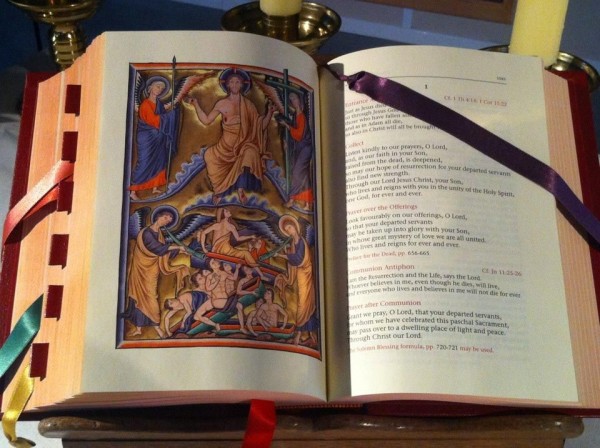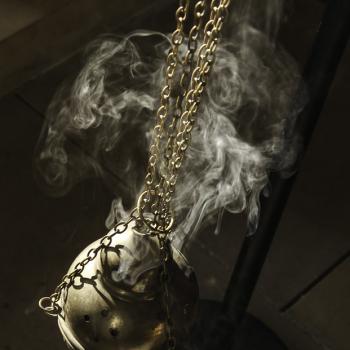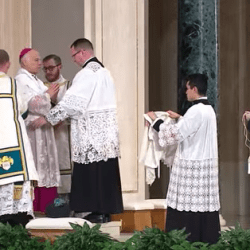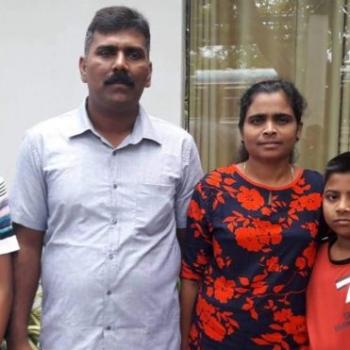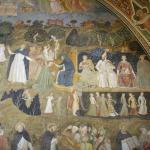[Click here for the readings.]
If I had to name the most inspiring hour of television I’ve seen this past year, it would be no contest: it was Diane Sawyer’s interview earlier this month with Congresswoman Gabby Giffords.
To see and hear Gabby Giffords, to see how alive she was after so many had literally declared her dead, was remarkable. But even more remarkable was the 40 minutes that preceded that. Those 40 minutes told the story of how she got there. It was riveting.
Last January, two days after Giffords was shot in the head, her husband Mark Kelly had an idea: to bring a video camera to the hospital and record his wife’s recovery. He wanted the world to be able to see her story. This is what the world saw: a scarred, bruised, bald, dazed figure in a hospital bed, struggling to reconnect. Through the videos Mark Kelly shot, we saw how his wife learned to move, to nod, to recognize people, to sit upright.
But what really hit me was the most fundamental struggle of all: her struggle to speak. She needed to relearn language.
It was an arduous process. She started by silently forming the words. One of the health care workers played a guitar and sang, as a way to trigger her memory.
Her first conversations were awkward. But bit by bit, she made connections. She learned to express what was on her mind, in her heart. She discovered a new way of thinking and speaking.
In some ways, Gabby Giffords’ struggle to communicate is the struggle of all of us. And reflecting on that, I think, helps us to understand the great adventure we embark on together this morning.
Beginning today, we communicate to God in a new way. As nearly everyone knows, this weekend we begin using the new translation of the Roman Missal – the most dramatic change in our liturgy in 40 years. It’s sparked a lot of debate and preparation and planning around the country, and for good reason. Like Gabby Giffords, we are trying to relearn the language – in this case, the language of prayer.
In a sense, it continues the great challenge that is behind all prayer — trying to express the inexpressible, to put into words hopes and aspirations and praise to a God who knows our every thought before it is even formed. It is daunting. Across the centuries, psalmists and prophets and saints have given us prayers of incredible depth and power and beauty. We have spoken them in Aramaic, and Greek, and Latin. We have prayed them together in our own tongue. They have been sung, chanted, translated into every language imaginable. In some cultures, they have been danced. We have prayed, even, in the language of silence.
All of this is part of a never-ending story – the story of our relationship with God.
It is a story, we discover, of deep longing. As we cried out in the psalm this morning: “Lord make us turn to you, let us see your face…”
“Let us see your face.”
There, in one phrase, is mankind’s greatest desire. When you look up from the pages of the missal and see the season that is now beginning, Advent, you realize that this is what it’s all about. Yearning. Desire. A longing to see the face of God. To express that more perfectly. And you realize, too, how fitting it is that we begin using this new translation of the Mass now, as we wait for Christ to come into the world.
Here we are, waiting for the world to be made new. With this Missal, that seems to be happening, literally, as we speak. It is almost as if we are praying the Mass for the first time.
But isn’t that how every Mass should be prayed?
Like all things new, it will take some adjustment. Like a lot of you, I’m saying goodbye to the only Mass that I remember. The Mass translation that we put aside last weekend was the one prayed at my wedding, at my parents’ funerals, at my ordination. It’s the one I know from countless Masses in churches from Brooklyn to Burbank.
But this day, the Church asks us, literally, to turn a page. What we find there is something that is part of our liturgical DNA. The words we pray this Sunday are deeply rooted in our past, linked more closely to the Latin that the Church has prayed for hundreds of years. They connect us more profoundly to our tradition.
But also, in a sense, they represent the next part of our ongoing conversation with our Creator.
God began that conversation in Genesis, with his first words, “Let there be light.” He needed to see what He was creating. In today’s gospel, the last word belongs to Jesus, and it’s also about seeing. “Watch,” he says. Be prepared.
But for us today, that word is not just a caution or a warning. It is an invitation, a call to us to open our eyes — and our hearts. Be alert, he is saying. Another Genesis is about to unfold.
The same could be said about the new translation of the Missal.
Besides “Watch,” I might suggest another word to remember as we begin this holy season: “Listen.” Listen to the prayers of the Mass this Advent – and listen, as well, to the prayers of our hearts. This is a moment of discovery and rediscovery. Listen. Hear the Mass anew. Hear what it is saying to us. Listen to how our hearts respond.
It’s going to take us a while to master this new way of praying. In the weeks to come, we’ll all be using the prayer cards and reading the missal in the pews a lot more closely. We’ll be trying to say the right words. Old habits die hard.
But I’d like to leave you with this one idea. One that, I think, may put all this anxiety about the new translation in perspective.
Consider what is about to happen on this altar – Who will be with us, what we are about to be given. Consider the incomparable gift we are about to hold in our hands.
Two thousand years of interpretation and translation and re-translation almost seem beside the point.
This is something beyond words, beyond language, beyond the limitations of human expression.
Given the great miracle and mystery that is about to take place before us… we should all be rendered speechless.

